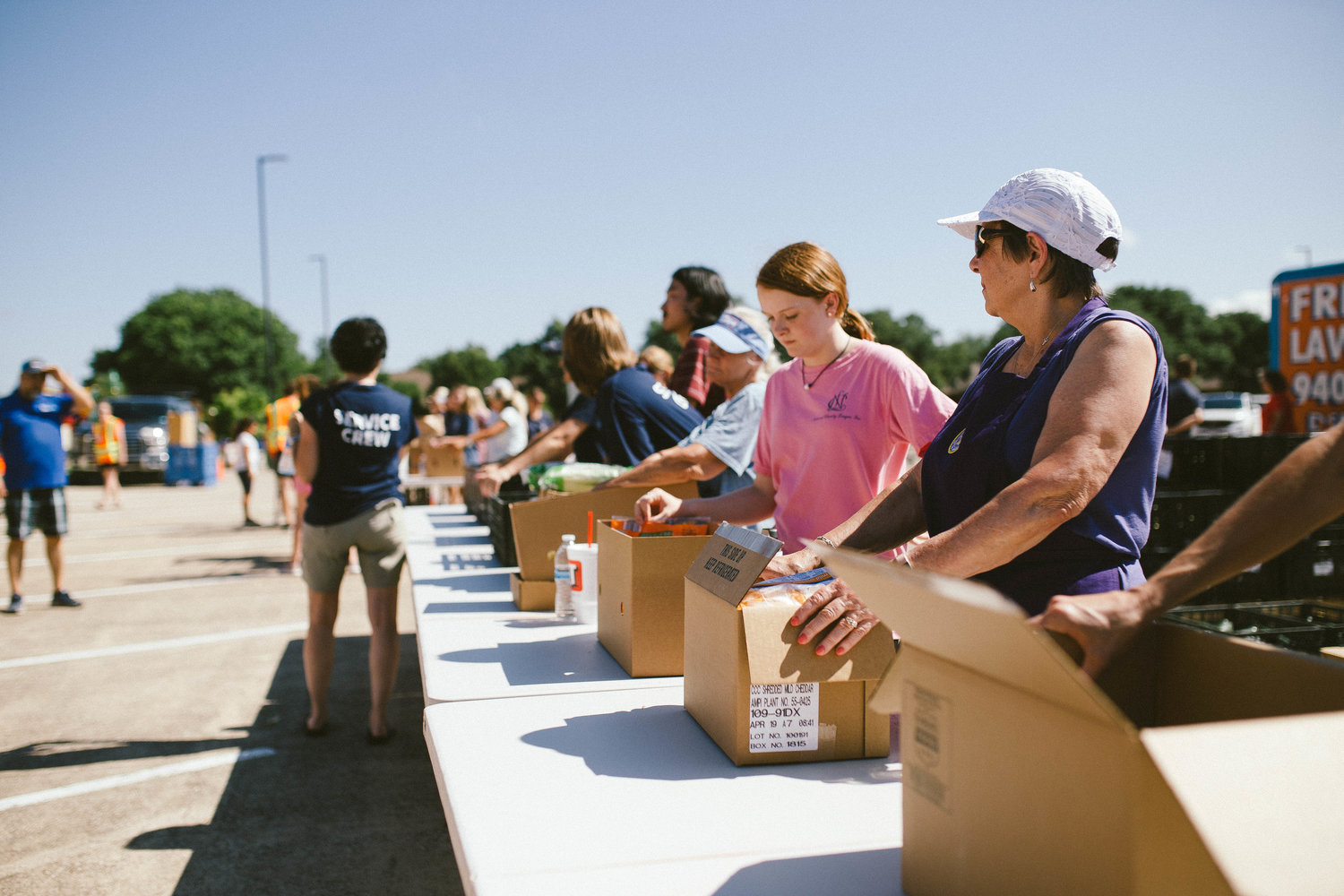With more than 11 million homes in the United States already in food insecure conditions, the recent lack of food resources due to the COVID-19 pandemic has threatened households experiencing unreliable food resources. The number of jobs lost due to the pandemic has also become a problem for those trying to provide food for themselves or their families. This rapid growth in unemployment and food insecurity has impacted many homes in America and could lead to up to a 4% increase in poverty and leave 17 million people without a suitable pantry.
The rate that the lack of food resources is decreasing at is quickly impacting North Texas residents. Some, like Texas Woman’s University junior education major Danae Daste McCurdy, said she finds it frightening when she goes to the grocery stores and sees that the shelves have been cleared out.
“I think the biggest thing I’ve noticed is an economic strain,” Daste McCurdy said. “Things that used to cost no more than two dollars are running out and all that’s left are the more expensive options.”
The pandemic has also been affecting various age groups differently due to Denton County’s stay-at-home mandate. Junior psychology major Katlynn Nguyen said that had it not been for her grandmother living with her and being able to shop for her, her grandmother would have gone through a lot of trouble trying to get items for herself during this time of quarantine.
“My grandma would have had difficulty shopping because seniors are urged to stay at home,” Nguyen said. “I can’t imagine how difficult it must be for those who are unable to go out and buy essential items like groceries.”
In an attempt to actively battle the increased cases of food insecurity, food distribution centers in the Dallas/Fort Worth area have taken into account the recent economic struggle and have increased the availability and quantity of their services. Many have altered their methods of distribution due to the dangers concerning the spread of COVID-19 but are still trying their best to actively serve the community as often as they can.
Denton County’s own Denton Community Food Center operates twice a week, allowing those in need to come and receive groceries, however, only once a month per person. The DCFC has been implementing social distancing, creating a system where recipients are to stay in their cars until told otherwise and are then given groceries to load into their car themselves to minimize physical interaction. The center has been experiencing some difficulties due to the persisting pandemic but still aims to help as many people as they can by now accepting limited donations to keep the shelves stocked.
Other organizations such as the North Texas Food Bank and Tarrant Area Food Bank have also increased their efforts to help relieve the struggles that may come with food insecurity among their respective communities. The NTFB has drawn out intensive plans to give out as much food as they can at a quick pace, raising their weekly goals and expanding their labor by increasing the amount of work done on the center’s production lines and warehouse and supply chains. Meanwhile, the TAFB is distributing up to 800,00 meals weekly to Tarrant County residents, as well as providing dinners for children who have been sent home from their school districts.
Nguyen said it’s important communities work alongside food banks and contribute to fight food insecurity, if they are able to.
“I recommend donating food items you are not using to your local pantry drives, volunteer if you are able and check in with friends and neighbors to see if they need anything,” Nguyen said. “At this point in time, it is important that we support together as a community.”
Meanwhile, with TWU’s mobile food pantry serving about 215 people monthly, it has been challenging trying to continuously serve those who benefited from its services since its shutdown, Executive Director of the Campus Alliance for Resource Education (CARE) Amy O’Keefe said.
“The biggest advantage of the mobile food pantry was that it came to campus,” O’Keefe said. “So if you didn’t have a car or always carpooled with somebody, having it come to TWU made it a little easier. Now, people are having to figure out alternate ways to get to these other community pantries.”
The mobile pantry as well as the campus pantry stationed in the Old Main Building have been working to provide students with alternative resources since the campus’ closing. Professor and Chair of Social Work Dr. Nila Ricks has acknowledged the impact of the pantry’s shutdown and said efforts are being made to ensure students do not go without food.
“We’ve been diligently making sure that we are still meeting students’ needs even though none of us are on campus,” Ricks said. “It’s been a collaboration between myself, the CARE office with Amy O’Keefe, my dean Abigail Tilton and Dr. Annie Phillips who has been coordinating services for our international students.”
Together these three administrators, as well as the mobile pantry, have compiled a list of North Texas food resources for students to turn to when they are in need. Additionally, Ricks, Phillips and the CARE office have reached out to students and have been able to provide them with time slots where they can receive bundles of food via curbside pick-up. With that, the food pantry managed to debulk its stock and leave almost no food to waste.
For local Denton food assistance, the Denton Mobile Food Pantry is still open and distributes at locations like First Baptist Denton. To locate additional food distribution centers near you, visit foodpantries.org. Food distribution information can also be found in local newsletters and business websites.
Gakenia Njenga can be reached via email at gnjenga@twu.edu.
Featured image courtesy of Serve Denton.







Be First to Comment